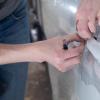TOP 3 Mistakes to Avoid While Upgrading Wheels
So, you want to upgrade your car's wheels to broader, bigger, or in contrast, smaller ones for your own reasons. This is a common and affordable way to upgrade your car and improve performance, handling or even solve comfort issues like noise level or vibration. And it is a relatively simple process - take the old wheels off and install the new wheels or tires. What can possibly go wrong?
In fact, there are many things to consider here, and we are going to look at them more closely right now.
What happens if you get the tire size wrong?
Car wheels come in a wide range of sizes for two reasons: each car has specific needs, carefully evaluated by the manufacturer, and on the other hand, size has an impact on the way your car "behaves" on the road. Both reasons are worth keeping in mind.
If you are going for an upsize, you can get better traction, but if you get wheels that are too large, the result will be less pleasing. When the size is too different from the originally intended, your car's acceleration suffers first. Bigger wheels turn slower, and they are definitely heavier, so you will also notice that steering becomes less responsive and agile.
It can damage other systems as well, like transmission and braking, by putting more strain on them. And let's not forget about discrepancies in odometer and speedometer readings that are also dependent on the wheel size.
With that in mind, does getting smaller wheels means smaller problems? Unfortunately, no. Even if you downsize by switching to smaller tires and leave the rims alone, you get roughly the same list of potential issues involving transmission, brakes, and inaccurate numbers from speedometer and odometer, only this time, they will exaggerate instead.
To avoid unnecessary complications, try to stay within 20 mm if you upsize and if you downsize, make sure that the middle of your tire fits perfectly.
Tire size affects fuel efficiency
A car is an intricate system where all the parts are interdependent, so if you alter one thing, it results in something not unlike a chain reaction of changes. "Even such a common car modification as changing wheel size makes a difference," according to Charles Farrell, the co-editor of the Wheelssize.com, a website dedicated to car wheels specifications. So don't be surprised if after you switch to bigger, bulkier wheels, your fuel consumption goes up as well.
Larger tires, as has already been mentioned, are heavier, and it takes more effort to move them. Hence the shift in your typical gas mileage. Mind that if your ultimate goal is fuel economy. For this reason, you might sacrifice better ground clearance and off-road performance for a small but still rewarding boost in fuel efficiency by switching to smaller tires.
Don't forget about your wheel offset
Once you decide to change your wheels, remember that it is not only the size and pattern you should be concerned with, but a wheel offset value as well. The offset of your vehicle's wheels is the distance between them and the fender. The term "offset" refers to how far apart the tires are from each other in a wheel well and how much space you have on either side of the tire. Because a wheel with an incorrect offset may cause problems with your suspension, brakes, and even rub the fenders while rolling.
So, for instance, if you're using the same width as your stock tires, all you need to be aware of is the new wheel's offset. It will have an impact on the way you control your car. And if you actually decide to downsize or scale up, get ready to calculate that offset using the new numbers from wheel specs because it is going to change. You can do it on your own using a formula, ask an expert, or use an online tool. Just don't skip this step.
The rule of thumb here is "stay within 5 mm", and you should be fine. It is not a good idea to get wheels with an offset that differs more than that value.
The bottom line
Upgrading wheels may be a simple process, but only if you come prepared. It takes a little bit of research, evaluation, and effort to get everything sorted out before you start. But no doubt, it is worth your time since preventing mistakes is always cheaper and easier than correcting them.
More to Read:
Previous Posts:



